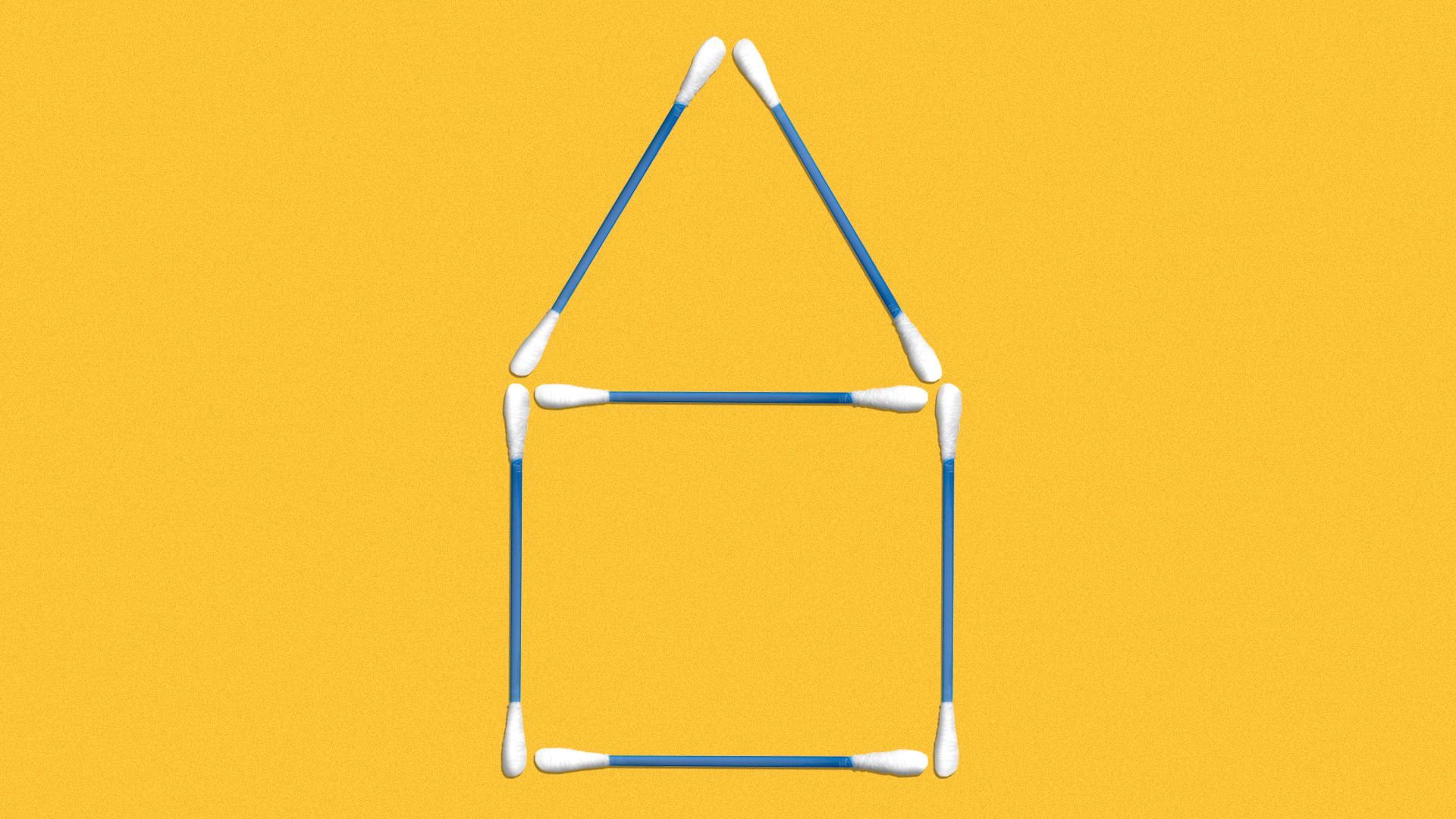How mass rapid tests could help curb the pandemic
Add Axios as your preferred source to
see more of our stories on Google.

Illustration: Aïda Amer/Axios
Vastly expanded approval and distribution of rapid, at-home tests represents a powerful tool in the fight against COVID-19 — and just possibly, the future of disease diagnostics.
Why it matters: Vaccines will take time to arrest the spread of the coronavirus — even without problems around distribution and acceptance. Some experts believe mass rapid testing could quickly identify who is really at risk of spreading COVID-19 and turn around the out-of-control pandemic in the U.S.
Driving the news: On Tuesday, the FDA granted emergency authorization to Ellume's over-the-counter antigen COVID-19 test for fully at-home usage — akin to a standard home pregnancy test.
- This is the first test the FDA has approved that can be taken without a prescription and produce results — in about 20 minutes — without the need to either mail in a sample to a lab or wait in line for a clinic.
- Michael Mina, an epidemiologist at the Harvard T.H. Chan School of Public Health, believes if just half the U.S. population were able to test themselves every four days, the country could quickly achieve vaccine-like "herd immunity" by letting people know in real time when they were contagiouss.
- "Scale these tests up, get these into everyone’s home, put these at the door of a restaurant, put these at the door of a gym," Mina said in a press call last week. "We change the balance."
How it works: What Mina is suggesting is similar to the daily COVID-19 testing carried out by the NFL and other professional sports leagues — which is meant to regularly sweep for infections before they lead to outbreaks — albeit on a much larger scale.
- Those leagues use PCR tests, which are more accurate than rapid antigen tests, but also more expensive and require lab processing.
- But rapid antigen tests can cost as little as $5, and entirely at-home tests take labs out of the picture.
- The economic benefits of mass, rapid COVID-19 screening would exceed the costs — which they pegged at around $28 billion — by 4–15 times, even without adding in the value of the lives that might be saved, according to a paper published by Mina and a team of economists in October.
The catch: Using less-accurate antigen tests would inevitably result in both false negatives — meaning cases that would be missed — and false positives.
- Such testing errors could end up "eroding confidence to the point where people don’t trust it," Amanda Harrington, director of the clinical microbiology laboratory at Loyola University Medical Center in Illinois, told the New York Times in September.
- Opponents also worry any plan that puts regular tests in the home introduces the possibility of human error, as ordinary people need to remember to take — and correctly interpret and ideally report — tests on a regular basis.
- As infectious disease experts Matthew Pettengill and Alexander McAdam wrote in a journal editorial earlier this year, it remains "an open issue whether such tests can be developed and produced at the massively needed scale any more quickly than vaccines."
Yes, but: Mina has argued while rapid tests will miss some cases that PCR diagnostics would pick up, antigen tests are particularly good at identifying when people are most contagious.
- The false-positive problem can be countered by having those who test positive take another rapid test for confirmation.
- As for feasibility, Mina told New York magazine it's largely a matter of will. "If the government really wanted to do that, that is not hard to do at all."
What's next: For all the U.S.' struggles around testing, the pandemic has seen an explosion in innovation around at-home diagnostics, as my Axios colleague Marisa Fernandez reported.
- Companies like LetsGetChecked and Everlywell have experienced a surge in demand for at-home tests for other conditions like Lyme disease and vitamin deficiencies.
- Wearables that track biometrics have shown some success in identifying probable COVID-19 cases before clear symptoms even begin to show up.
- "One of the good things to come out of this terrible year is that we've gotten used to doing more testing," says Isaac Turner, the CIO of Curative, a startup that handles some 10% of COVID-19 testing each day in the U.S. "There are many diseases where extra testing would be fantastic."
The bottom line: Technology will push more diagnostics into the home, and while that comes with regulatory challenges, the benefits of more ubiquitous mass testing appear to outweigh the concerns — especially in an age when pandemics like COVID-19 could become more frequent.
